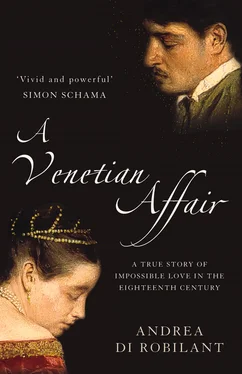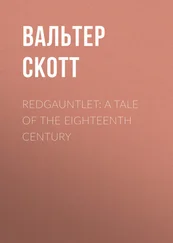The Seven Years’ War (1756–1763) between the major European powers would soon come to darken spirits and change the atmosphere in the city. The Venetian Republic, neutral throughout this long conflict, which put an end to French expansionism and marked the rise of Great Britain as the dominant power, was going to feel adrift and ultimately lost after the war. But until then there prevailed a sense that things would go on unchanged as they had for centuries and that life should therefore be enjoyed to the fullest.
In those happier years the house of Consul Joseph Smith, a rich English merchant turned art collector, was one of the busiest and most interesting places on the Venetian scene—a meeting point of fashionable artists, intellectuals, and foreign travelers. It was in Smith’s art-filled drawing room at Palazzo Balbi, on the Grand Canal, that Andrea met Giustiniana sometime in late 1753. He was twenty-four; she was not yet seventeen. Andrea was tall and vigorous—handsome in a Venetian sort of way, with the long, aquiline nose that was typical of many patrician profiles. His sharp mind was tuned to the new ideas of the Enlightenment, and he was possessed of the natural self-confidence that came with his class—assured as he was of his place in the Venetian oligarchy. His elders already looked upon him as one of the brightest prospects of his generation. And indeed he must have seemed quite the dashing young man to a girl eight years his junior—wise beyond his age and so much at ease in Consul Smith’s rather intimidating salon . But Giustiniana too stood out in those assemblies. Behind that innocent, awestruck gaze was a lovely girl brimming with life. She was bright, alert, and possessed of a quick sense of humor. Andrea was instantly taken with her. She was so different from the other young women of his set—familiar, in a way, for after all she was a Venetian born and raised, yet at the same time very distinctive, even a little exotic, not only on account of her English blood but also because of her unique character.
Andrea and Giustiniana met again and again at Consul Smith’s. The physical attraction between them was plain to see: soon they could not bear to be apart. But something deeper was going on, too, more magical and mysterious: it was the blending of two souls that were very different and nevertheless yearned for each other. “My passion for him swallowed everything else in my life,” 5 Giustiniana recalled many years later. Andrea too was overwhelmed by his feelings in a way he had never been before.
Alas, the earliest part of their love story has remained blurred. If they wrote letters to each other during that time—as is probable—those letters have never surfaced. But in the later correspondence there are echoes of their first enchanted days together, as they chased each other in the rooms of Palazzo Balbi searching for a darkened corner where they could hold each other and kiss in the full rapture of new love.
From the very beginning the love story of Andrea and Giustiniana bore a note of defiance toward the outside world. Carried along by the sheer power of their feelings, they pursued a relationship in the face of social conventions that were clearly stacked against them. It is true that by the mid–eighteenth century, as pre-Romantic stirrings spread through Venetian society, young men and women who loved each other were beginning to challenge the rigid customs of the aging Republic. The number of clandestine marriages, secretly sanctioned by the Church, saw a considerable increase in those years. But the costs of breaking the rules were still very high. As one historian has put it, “Any patrician who attempted a secret marriage put himself quite inevitably in direct conflict with his family and institutions. By bringing dishonor on himself he renounced any political career and lost the privilege of seeing his own children recognized as members of the patriciate. He might lose all economic assistance from the family and be disinherited.” 6
The clandestine marriages that did take place mostly involved impoverished patricians or members of the lesser nobility, who did not have much to lose by defying their elders. To Andrea, with his family history, his education, his strong sense of duty toward the Republic, the idea of secretly marrying Giustiniana seemed completely irrational. Apart from the shame it would have brought on his family, it was hard to see how the marriage would have survived from a practical point of view. Where would they have lived? What would they have lived on? Despite her youth and her intense emotions, even Giustiniana was realistic enough to see that if they fought the time-honored customs of the Republic they would be crushed.
A few months into their affair, Giustiniana’s mother stepped in. Mrs. Anna had one pressing task, which was to find a suitable husband for her eldest daughter. This meant she had to keep Giustiniana at a safe distance from hot-blooded young Venetian patricians—who might try to seduce her for the sake of intrigue and entertainment but would never marry her—while she looked out for a sensible if less glamorous match. She could not allow Giustiniana to wreck her plans with a relationship that in her eyes had no future and would only bring dishonor upon the family. So in the winter of 1754 she told Andrea never to call on Giustiniana at their house again and forbade the two lovers from seeing each other.
Mrs. Anna’s ban seemed to spell the end of their forbidden love. But their timeworn letters have continued to surface over the years—in the archives in Padua, in the attic at Palazzo Mocenigo, at Randolph Macon College—to reveal that in fact this was only the beginning of a remarkable love story.
Early in the evening Andrea caught up with Giustiniana at the theater. She was radiant in her brocaded evening cape, and the anxious way she was looking around for him made her seem lovelier than ever. She smiled as she saw him, and they exchanged a few signals from a safe distance, apparently without raising Mrs. Anna’s suspicions. After the play, Andrea followed mother and daughter to the Ridotto, keeping close to the walls of the narrow streets and casting nervous glances ahead. In the gambling halls, among the late-night crowd of masked men and women hovering around the faro tables, he had a much harder time avoiding Mrs. Anna as she flitted in and out of the shadows in the candlelit rooms. He was terrified she might suddenly come upon him and make a horrible scene. Unnerved by all the difficulties, he finally gave up and went home without having had his cherished moment alone with Giustiniana.
That night he hardly slept, shifting restlessly in his bed, wondering if he had abandoned the Ridotto too abruptly and not made it sufficiently clear to Giustiniana why he was leaving the scene. The next morning he rose early and wrote to her at once:
My beloved ,
I am very anxious to know whether your mother noticed anything last night—any act of imprudence on my part—and if you yourself were satisfied or had reason to be cross. Everything is so uncertain. At the theater things didn’t go badly, but at the Ridotto—I don’t know how it all ended at the Ridotto. As long as I was in your mother’s range I tried to conceal myself—as you probably saw. And rest assured that when I did not show myself to you it was because Mrs. Anna was looking in my direction. Once you left the rooms I no longer saw our tyrant and imagined we had lost her for good—your own gestures seemed to suggest as much…. But I asked around and was told she was still there…. I waited a while to see for myself, and sure enough there she was again. So I resolved to put myself out of her sight . *
Mrs. Anna clearly hoped that, thanks to her intervention, the passion so perilously ignited in the house of Consul Smith would subside before any irreparable damage was done to her daughter. But she had wrenched them apart just as they were falling deeply in love. Their need to be together was stronger than any obstacle she could put in their way; the thrill of their forbidden relationship only drew them closer. As Andrea pointed out to Giustiniana, her mother’s relentless watch and the atmosphere of general disapproval she helped to foster around them made their desire to be together “even more obstinate.” In fact, there had been no separation to speak of in the wake of Mrs. Anna’s pronouncement. The two lovers continued to look for each other ever more frantically, playing a highly charged game of hide-and-seek in the streets of Venice, at the theater, among the crowd at the Ridotto.
Читать дальше












